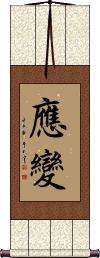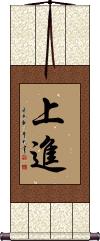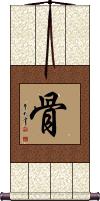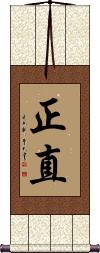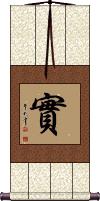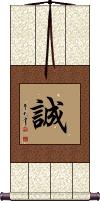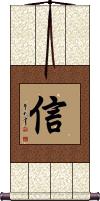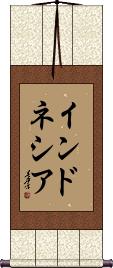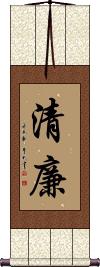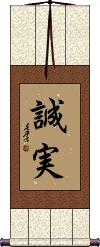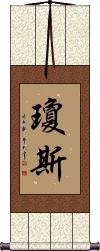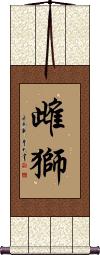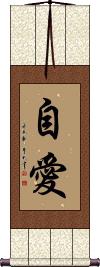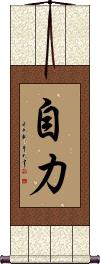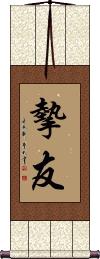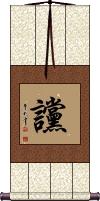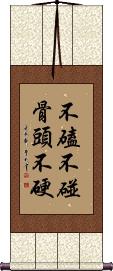Many custom options...
And formats...

Ones in Chinese / Japanese...
Buy an Ones calligraphy wall scroll here!
Personalize your custom “Ones” project by clicking the button next to your favorite “Ones” title below...
Switched to secondary search mode due to lack of results using primary.
These secondary results may not be very accurate. Try a different but similar meaning word or phrase for better results. Or...
Look up Ones in my Japanese Kanji & Chinese Character Dictionary(My dictionary is a different system then the calligraphy search you just tried)
If you want a special phrase, word, title, name, or proverb, feel free to contact me, and I will translate your custom calligraphy idea for you.
2. Ambitious / To Improve Oneself
3. Bones
4. Cantoness
5. Honesty
7. Indonesia
9. Integrity: Sincere Honest and Faithful
10. Jones
11. Jonesy
12. Lioness
13. Onesimo
14. Quiniones
15. Quinones
17. Self-Love / Love Yourself / Love Oneself
18. Changing Oneself / Self Reformation
19. Power of Oneself / Self-Sufficient
20. Most Sincere Friend / Honest Friend / Real Friend / Best Friend
21. Standing by Oneself / Walking by Oneself
Adapt Oneself
應變 means “to meet a contingency,” “to adapt oneself to changes,” or “to adapt to changes” in Chinese.
It's also used in Japanese but usually only in the context of Buddhism. 應變 is probably the shortest way to express the idea of adapting and overcoming whatever circumstances present themselves.
Ambitious / To Improve Oneself
Advance and Progress
上進 is a Chinese and Japanese Kanji word that means to advance, to make progress, to do better, to be ambitious, to improve oneself, or to move forward.
This can refer to a single person, general things (such as a work project), or a whole country.
In Japanese, this is sometimes used as the given name Joushin.
Bones
骨 is Chinese, Japanese, and Korean for bone or bones.
If your name happens to be Bone or Bones, this is a cool character for a wall scroll to hang in your home or office.
Cantoness
Cantoness
Honesty
正直 or honesty is being truthful and sincere. It is important because it builds trust. When people are honest, they can be relied on not to lie, cheat or steal. Being honest means that you accept yourself as you are. When you are open and trustworthy, others can believe in you.
正直 is one of the 8 key concepts of Tang Soo Do.
Note: This entry is cross-listed as "integrity" because it also fits that definition.
![]() Please note that the second Kanji sometimes has an alternate form in Japanese. Let us know if you want the alternate form shown to the right.
Please note that the second Kanji sometimes has an alternate form in Japanese. Let us know if you want the alternate form shown to the right.
Honesty
Honesty
誠 means truth, faith, fidelity, sincerity, trust, and/or confidence.
As a single-character wall scroll, this suggests that you believe “honesty is the best policy,” as your personal philosophy.
This is also a virtue of the Samurai Warrior
See our page with just Code of the Samurai / Bushido here
Honesty / Fidelity
信 is another character that expresses the idea of honesty.
It can also mean truth, faith, belief in, fidelity, sincerity, trust, and/or confidence.
Some have included this in the list for the Bushido, although “makoto” is probably more common/popular.
Note: In some contexts, this character can mean a letter (mail), news, or envoy. However, alone, it will generally be read with the honesty-meaning.
See our page with just Code of the Samurai / Bushido here
See Also: Loyalty Trustworthiness Trustworthy
Indonesia
Indonesia
Integrity / Honesty
Integrity: Sincere Honest and Faithful
Jones
Jones
Jonesy
Jonesy
Lioness
雌獅 is how to write “lioness” in Chinese.
Note: 雌獅 is not a very common title for a wall scroll in China. Perhaps because lions are not indigenous to China. Though oddly enough, the rarity of lions made them very prized - and lion dances are a popular festival attraction.
If you see the name of this animal species written on a wall scroll, it's more likely to be the masculine form of “lion.”
Onesimo
Onesimo
Quiniones
Quiniones
Quinones
Quinones
The Roar of the Lioness
河東獅吼 is actually a proverb and joke about the plight and fear of a hen-pecked husband.
In ancient times, it was used to describe a wife who would berate her husband or go into jealous rages. However, this phrase currently brings about ideas of a husband that cowers in fear and cringes when his wife screams (or roars) at him.
Please only purchase this as a good-natured joke. If your wife or husband does not have a good sense of humor, it's probably not a good idea to hang this on your wall to irritate your mate.
Self-Love / Love Yourself / Love Oneself
自愛 means self-love, self-regard, regard for oneself, cherishing one's good name, taking care of oneself, or love myself.
In the Buddhist context, this is the cause of all pursuit or seeking, which in turn causes all suffering. All Buddhas discharge themselves from self-love and all pursuits of personal gratification. Such elimination of self-love is a step towards nirvāṇa.
This title can be taken as positive or negative, depending on how you read it. Some will see it as arrogant, and others will read it as a token of self-respect. Because of this ambiguity, I do not recommend this title for a wall scroll.
Changing Oneself / Self Reformation
Power of Oneself / Self-Sufficient
自力 is a word in Chinese, Japanese Kanji, old Korean, and Buddhist term meaning: the power within oneself; self-sufficient; by oneself; self-made; self-power; inner ability.
Most Sincere Friend / Honest Friend / Real Friend / Best Friend
摯友 is one way to say best friend in Chinese.
The first character can mean “honest” or “most sincere.” The second character means “friend” or “friends” (plural forms work differently in Chinese).
See Also: Friendship | Soulmates
Standing by Oneself / Walking by Oneself
Honest / Straightforward
Strong bones come from hard knocks
不磕不碰骨頭不硬 is a Chinese proverb that literally translates as: Without being knocked around a bit, [one's] bones won't become hard.
Figuratively, this means: One can't become strong without first being tempered by “hard knocks.”
While true for everyone, this sounds like the “Iron Body” form of Kung Fu, where practitioners' bodies are beaten (and often bone fractured) in order to become stronger.
For the rest of us, this is just about how we can be tempered and build character through the hardships in our lives.
This is not a common title for a wall scroll in China.
True Victory is Victory Over Oneself
正勝吾勝 is a proverb that is often translated as “True victory is victory over oneself.”
However, literally, Kanji by Kanji, means “True victory [is] my/self victory.”
My Japanese friends rate this very highly for a wall scroll.
See Also: Know Thy Enemy Know Thyself
The following table may be helpful for those studying Chinese or Japanese...
| Title | Characters | Romaji (Romanized Japanese) | Various forms of Romanized Chinese | |
| Adapt Oneself | 應變 应变 | ou hen / ouhen / o hen | yìng biàn ying4 bian4 ying bian yingbian | ying pien yingpien |
| Ambitious To Improve Oneself | 上進 上进 | jou shin / joushin / jo shin | shàng jìn shang4 jin4 shang jin shangjin | shang chin shangchin |
| Bones | 骨 | hone / kotsu | gǔ / gu3 / gu | ku |
| Cantoness | 康托內斯 康托内斯 | kāng tuō nèi sī kang1 tuo1 nei4 si1 kang tuo nei si kangtuoneisi | k`ang t`o nei ssu kangtoneissu kang to nei ssu |
|
| Cantoness | カントネス | kantonesu | ||
| Honesty | 正直 | shoujiki / shojiki | zhèng zhí zheng4 zhi2 zheng zhi zhengzhi | cheng chih chengchih |
| Honesty | 實 实 | shí / shi2 / shi | shih | |
| Honesty | 誠 诚 | makoto | chéng / cheng2 / cheng | ch`eng / cheng |
| Honesty Fidelity | 信 | shin | xìn / xin4 / xin | hsin |
| Indonesia | 印度尼西亞 印度尼西亚 | yìn dù ní xī yà yin4 du4 ni2 xi1 ya4 yin du ni xi ya yindunixiya | yin tu ni hsi ya yintunihsiya |
|
| Indonesia | インドネシア | in do ne shi a indoneshia | ||
| Integrity Honesty | 清廉 | sei ren / seiren | qīng lián qing1 lian2 qing lian qinglian | ch`ing lien chinglien ching lien |
| Integrity: Sincere Honest and Faithful | 誠實 誠実 | sei jitsu / seijitsu | ||
| Jones | 瓊斯 琼斯 | qióng sī / qiong2 si1 / qiong si / qiongsi | ch`iung ssu / chiungssu / chiung ssu | |
| Jones | ジョーンズ | joonzu / jonzu | ||
| Jonesy | 瓊斯 琼斯 | qióng sī / qiong2 si1 / qiong si / qiongsi | ch`iung ssu / chiungssu / chiung ssu | |
| Jonesy | ジョンジー | jonjii / jonji | ||
| Lioness | 雌獅 雌狮 | cí shī / ci2 shi1 / ci shi / cishi | tz`u shih / tzushih / tzu shih | |
| Onesimo | 奧內希莫 奥内希莫 | ào nèi xī mò ao4 nei4 xi1 mo4 ao nei xi mo aoneiximo | ao nei hsi mo aoneihsimo |
|
| Onesimo | オネシモ | oneshimo | ||
| Quiniones | 奎尼內斯 奎尼内斯 | kuí ní nèi sī kui2 ni1 nei4 si1 kui ni nei si kuinineisi | k`uei ni nei ssu kueinineissu kuei ni nei ssu |
|
| Quiniones | キニオネス | kinionesu | ||
| Quinones | 奎諾內斯 奎诺内斯 | kuí nuò nèi sī kui2 nuo4 nei4 si1 kui nuo nei si kuinuoneisi | k`uei no nei ssu kueinoneissu kuei no nei ssu |
|
| Quinones | クイノネス | kuinonesu | ||
| The Roar of the Lioness | 河東獅吼 河东狮吼 | hé dōng shī hǒu he2 dong1 shi1 hou3 he dong shi hou hedongshihou | ho tung shih hou hotungshihhou |
|
| Self-Love Love Yourself Love Oneself | 自愛 自爱 | ji ai / jiai | zì ài / zi4 ai4 / zi ai / ziai | tzu ai / tzuai |
| Changing Oneself Self Reformation | 自己改革 | ji ko kai kaku jikokaikaku | ||
| Power of Oneself Self-Sufficient | 自力 | jiriki | zì lì / zi4 li4 / zi li / zili | tzu li / tzuli |
| Most Sincere Friend Honest Friend Real Friend Best Friend | 摯友 挚友 | zhì yǒu / zhi4 you3 / zhi you / zhiyou | chih yu / chihyu | |
| Standing by Oneself Walking by Oneself | 獨立獨步 独立独步 | do kuritsu do ppo dokuritsudoppo do kuritsu do po | ||
| Honest Straightforward | 讜 谠 | dǎng / dang3 / dang | tang | |
| Strong bones come from hard knocks | 不磕不碰骨頭不硬 不磕不碰骨头不硬 | bù kē bù pèng gǔ tóu bù yìng bu4 ke1 bu4 peng4 gu3 tou2 bu4 ying4 bu ke bu peng gu tou bu ying bukebupenggutoubuying | pu k`o pu p`eng ku t`ou pu ying pukopupengkutoupuying pu ko pu peng ku tou pu ying |
|
| True Victory is Victory Over Oneself | 正勝吾勝 正胜吾胜 | masa katsu a gatsu masakatsuagatsu | ||
| In some entries above you will see that characters have different versions above and below a line. In these cases, the characters above the line are Traditional Chinese, while the ones below are Simplified Chinese. | ||||
Successful Chinese Character and Japanese Kanji calligraphy searches within the last few hours...
